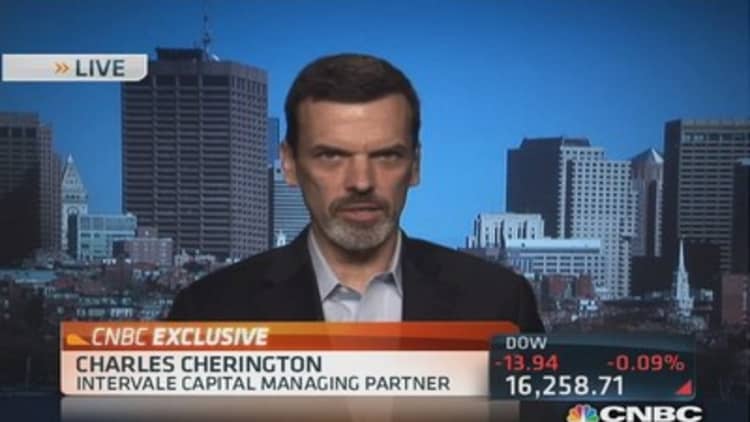As crude oil prices rise amid tensions between Russia and the west over Ukraine, increased U.S. oil production is providing a cushion against even higher prices.
The global energy industry is gathering in Houston this week for the annual IHS CERAWeek energy conference and talk has turned to uncertainty surrounding Russia's invasion of Crimea. But unlike other geopolitical crises, this time the U.S. energy industry is being looked at as a bigger supplier to global energy markets.
"U.S. production growth and Saudi Arabia's ability to adjust production with demand - those are the two keys to price stability," said Jim Burkhard, vice president and head of global oil markets and energy scenarios at IHS. Even with three million barrels off the market from places like Venezuela, Iran and Libya, the world has been able to absorb those losses because of U.S. production increases – totaling about three million barrels from 2010 through 2014, he said.
(Read more: Ukraine tensions boost oil but resistance is strong)
Even as the U.S. continues to import 7 million barrels of oil a day, talk at the conference also focused on the possibility of the U.S. exporting oil. Sen. Lisa Murkowski, (R. Alaska) opened the conference with a call to export oil, now largely prohibited except from Alaska or to Canada.
Murkowski said she asked the Energy Information Administration to conduct a study on the economics of oil exports. She also called for more energy production on federal land. The U.S. currently produces about 8 million barrels a day, up a million barrels from just a year ago.
Burkhard expects an average Brent crude price of $106 per barrel this year, and $98 for West Texas Intermediate, if there are no further major supply disruptions and U.S. production continues to grow.
The U.S. already has plans to export natural gas when terminals are completed over the next several years, but the push by the industry and others to export oil is relatively new. Opponents, including the refining industry, say it would drive up prices, and there are also national security concerns.
(Read more: G7 condemns Russia's move on Ukraine, halts G8 prep)
But the uncertainty around Russia's intentions with the Ukraine was getting more attention in the hallways of the annual conference. Russian Minister of Energy Alexander Novak cancelled his appearance over the weekend, just after Russian troops seized control of Crimea, part of Ukraine since 1954.
Western powers have opposed the invasion, while Ukraine said on Monday that Russia seized border posts and was adding troops. Late Monday, the U.S. said it would suspend trade and investment talks with Russia. Secretary of State John Kerry is set to visit Kiev Tuesday.
"I would say that anyone who is not concerned by this is being overly sanguine. They are just assuming this is all going to work itself out," said Richard Haass, president of the Council on Foreign Relations. Haass was one of the opening speakers at the conference.

"I don't think anyone can say with real certainty what Mr. Putin's end game is," he said, in an interview. Haass said neither side wants an escalation but it's unclear whether Putin is seeking more influence over affairs in Ukraine, to take control of Crimea or to seize all of Ukraine.
Whatever the outcome, the situation is focusing attention on Russia's energy relationship with Europe.
Europe receives about 3.5 billion barrels a day of oil from Russia, but the bigger issue is about half the gas heading for Europe from Russia goes through the Ukraine.
(Read more: It's time to export 'abundance' of US oil: Senator)
The Ukraine is an important gateway for Russian gas transmission to Europe and elsewhere, but Russia has been moving to reduce its dependence on the country. Gas is also a major source of friction between Russia and Ukraine, which owes Russia billions.
"A decade ago, Ukraine played the same role it does now. It's the gateway for gas. It did the same for oil," said Matt Sagers, senior director Russia and Caspian Energy at IHS.
Haass said if the U.S. moves toward energy sanctions against Russia, it could consider putting more U.S. oil on to the world market to ease prices.
"I was in favor of opening the export spigot before this," he said.
Separately, Kevin Book, managing director of ClearView Energy Partners, said in a note that the energy relationship with the West may actually act as a brake on both Western governments and Russian actions.
(Read more: 'Nazis' and 'Hypocrites': What Russia's saying on TV)
"This Russian conflict with Ukraine may have more to do with Cold War-style force projection than natural gas pipelines, but several energy policy implications stand out nonetheless. First, the E.U.'s dependence on Russian natural gas may constrain Western actions, but Russia has its own compelling commercial reasons to keep gas flowing.
Second, Europe has few near-term alternatives to Russian gas, but the set of medium-to-long-term options goes beyond U.S. LNG. Finally, political challenges and economic realities may limit the extent to which U.S. LNG can offer Europe a supply diversification solution," he wrote.
—By CNBC's Patti Domm. Follow her on Twitter @pattidomm.





